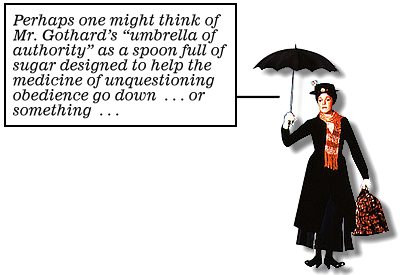
|
While some people did raise concerns about
Gothard’s “umbrella of authority”/“chain-of-command” teaching, a truly
disturbing feature of American conservative evangelicalism in the 1970s
and ’80s was how few leaders and teachers objected to it.
Bill Gothard was reviving medieval ideas about church authority that had
been rejected by the Protestant Reformation — and even by many Roman Catholics!
— and yet the heirs of that Reformation hardly noticed.
In fact, many evangelicals adopted it in modified form and used it in their sermons. It was not uncommon in the 1970s and ’80s to hear very Gothardesque talk about being “under a pastor’s spiritual authority” from evangelical pulpits, and many churches adopted Gothard’s chain-of-command as their ecclesiastical norm. Most fundamentalists, by the way, loved the “umbrella” doctrine. Many cults also borrowed from Gothard’s authority doctrine to buttress their own oppressive hierarchical authority structures, one of the most famous being the Boston Churches of Christ (or “the Boston Movement,” later re-named International Churches of Christ). Despite the fact that Gothard’s Basic Seminar was replete misinterpretations of Scripture — the “umbrella” stuff being only one example — Christian leaders were generally silent. Gothard also loudly objected to the notion of Christians airing their differences in any public forum. He applied verses like Matthew 18:15 — where Jesus instructed his disciples to confront each other privately — not only to sins, but also to disagreements. So in effect he created a system in which he placed himself above public criticism. The church in general abdicated its responsibility to protect people from such authoritarian, oppressive teaching. But not everyone in the church kept their mouths completely shut like good little submissive Gothardites... |



